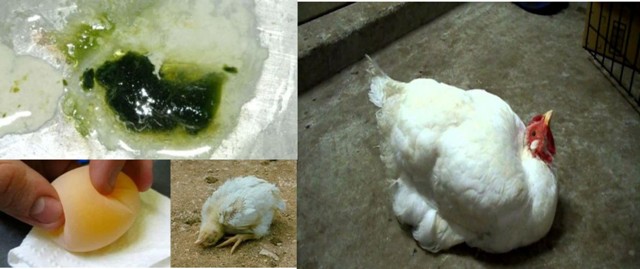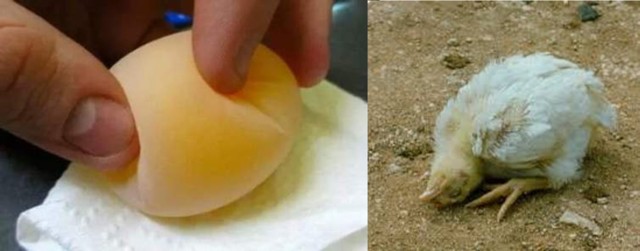Newcastle disease is a viral disease; it is one of the major diseases in poultry. It is termed virulent because of the high vulnerability of poultry birds to Newcastle disease. This makes it more serious and of major economic concern in poultry farming. Newcastle disease affects all chicken breeds as well as other poultry birds like turkeys. Sadly, Newcastle disease has no treatment because it is a viral disease; it can only be prevented through vaccination.
All poultry birds, irrespective of age, have the propensity to be down with Newcastle disease; this is why the Newcastle vaccine has the longest administration period on poultry birds. The virus to stimulates the outbreak of Newcastle disease resides within the birds; it only needs favorable conditions to escalate.
It is quite difficult to know the conditions that support Newcastle disease. The signs of Newcastle disease are very glaring, and these are what often prompt farmers to know their flock is down with this disease. Vaccination against Newcastle disease should be taken seriously at the right dosage and at the right time.
Types of Newcastle Disease
It interests me to let you know that Newcastle disease occurs in two ways; some literature says there are two types of Newcastle disease. They are:
- Lentogenic Newcastle Disease
- Chronic Newcastle Disease
In my opinion, there is no difference in occurrence. The only difference is the severity of the outbreak and this is a function of the management of the birds right from day one.
The Lentogenic Newcastle disease is a type that shows no prior symptoms but the sudden death of birds. It is usually characterized by a high level of mortality. It is caused by the failure or negligence of the farmer to vaccines and vaccinations. Some farmers do not believe in vaccines, and when Newcastle disease strikes, it kills the chickens in high numbers.
The chronic Newcastle disease is the common type that commercial poultry farmers experience. It shows visible signs of Newcastle disease, and it does not cause high mortality unless the farmer fails to react. It is often characterized by a decline in the overall performance of the birds.
The chronic Newcastle disease is often caused by a low dosage of vaccine, vaccine failure, or an overdue subsequent vaccination period. The farmer in this case does vaccinate the chickens, but he probably vaccinates at a low dose or vaccinates at the wrong time. Because the farmer actually administers the Newcastle vaccine makes the chicken develops some feeble resistance against the total effect of the Newcastle disease. This is why the birds would show signs of weakness in performance rather than outright mortality.
Read more: 8 Possible Causes Of Vaccine Failure In Chickens
Signs of Newcastle Disease in Chicks and Layers

In chicks
- Respiratory distress, such as coughing and sneezing
- Rhythmic movement or twisting of the neck
- Lack of appetite
- Nasal discharge
- The birds drone together, keep heads on the ground, when on a deep litter system.
- The birds make a screeching sound.
- The bird has diarrhea or watery poo
- Drooping wings
- In severe cases, Paralysis leads to death
In layers
- The bird would be off-feed, that is lack of appetite.
- The bird makes a screeching sound.
- The bird produces peewee eggs.
- The bird produces shell-less eggs.
- When it becomes severe and chronic, the birds turn their head and drop greenish feces.
- Swelling of the tissues of the head.
- Above all, there is a drastic drop in production.
Prevention and Treatment of Newcastle disease
Firstly, I need to tell you this truth. There is no poultry drug to treat Newcastle disease, this disease can only be prevented through administering the Newcastle disease vaccine, called Lasota vaccine. In addition, I would share with you effective management practices to control and prevent Newcastle disease.
1. Administer the Newcastle Disease Vaccine: Administering the Lasota vaccine to poultry birds when due is the only effective preventive measure against Newcastle disease. Lasota vaccine is given to chickens when they are 3 weeks old, 8 weeks, 18 weeks, and once in 2 months for laying birds. Lasota vaccine is administered to chickens through drinking water, eye drops, or a nasal spray. Check the chicken vaccination chart below to know the right time to administer the Lasota vaccine.
Read more: How To Administer Lasota Vaccine to Chickens Effectively
2. Proper Disinfection of Pen: At the end of every chicken production batch, ensure you disinfect the pen thoroughly before receiving new stocks. Proper disinfection of the poultry house helps eliminate any surviving pathogens within and outside the pen. The best practice is to disinfect with a chemical like formalin and steam wash the pen, then keep the poultry house vacant for about 2 weeks before stocking new birds. This helps eliminate the chemical residues.
Read more: How To Disinfect Or Fumigate A Poultry House
3. Adopt Biosecurity Measures: Biosecurity is a cultural way of reducing the spread of disease infections in poultry. It involves controlling the movement or traffic going in and out of your poultry house for proper safety. Some of these biosecurity measures include:
- Having a disinfectant foot dip at the entrance of the pen.
- Restricting the movement of strangers into the pen.
- Wearing protective gear like overalls and gloves when handling the birds.
- Separating poultry birds from different sources.
- Restricting the entrance of rodents, wild birds, and local chickens into the pen.
4. Use of Beneficial Herb: Herbs have been used to boost the immune system of chickens over the years. Although the herbs are not standardized, they have proven to be very effective at controlling several poultry diseases. One of the most effective herbs I have come across for the prevention of Newcastle disease in poultry is Christmas melon, called Tagiri in the Yoruba language. Other herbs you can consider are the Cayenne pepper, black pepper, aloe vera extract, and more. The extract from these herbs is extracted and mixed with the drinking water of the birds.
Read more: 10 Recommended Herbs For Chicken’s Healthy Growth
Vaccination Chart For Chicken
This vaccination chart shows the list of vaccines a chicken needs at the right time and the method of administering the vaccines. Strict adherence to this vaccination chart will help reduce mortality and boost the immune system of the birds.

Lastly, Newcastle disease is highly fatal to chickens and can only be prevented through proper vaccination and other aforementioned preventive measures. Failure to vaccinate the chicken against Newcastle disease when due leads to the sudden death of birds. Sure you’ve gained something new. Share and let others benefit!
Happy farming!

Thanks for the post.very educative